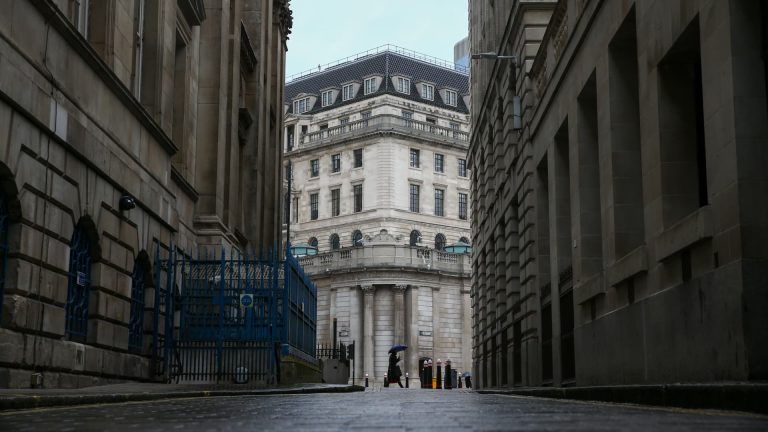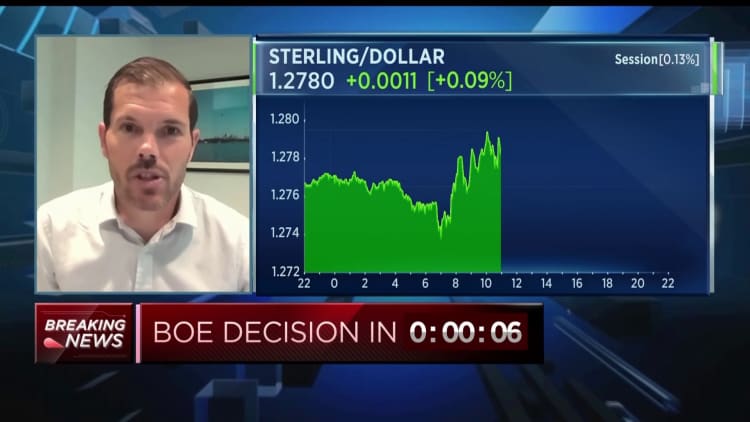
[ad_1]
A passageway near the Bank of England (BOE) in the City of London, U.K., on Thursday, March 18, 2021.
Hollie Adams | Bloomberg | Getty Images
LONDON — The Bank of England on Thursday surprised markets with a 50 basis point hike to interest rates, its 13th consecutive increase as policymakers grapple with persistently high inflation.
The Monetary Policy Committee voted 7-2 in favor of the half-percentage–point increase, which takes the Bank’s base rate to 5%. The move defied market expectations, which had priced in around a 60% chance of a 25 basis point hike.
Sterling slipped against the dollar after the announcement, and U.K. gilt yields tumbled, with the 10-year yield dropping over 5 basis points. Yields move inversely to prices.
Fresh data on Wednesday showed annual U.K. consumer price inflation was 8.7% in May, unchanged from the previous month, cementing market expectations that the MPC would opt for another hike. Economists also upped their expectations for further monetary tightening in the future.

Most worryingly for the central bank, core inflation — which excludes volatile energy, food, alcohol and tobacco prices — was 7.1% year-on-year in May, up from 6.8% in April and marking its highest rate since March 1992.
“There has been significant upside news in recent data that indicates more persistence in the inflation process, against the background of a tight labour market and continued resilience in demand,” the MPC said in its summary Thursday.
“The MPC will continue to monitor closely indications of persistent inflationary pressures in the economy as a whole, including the tightness of labour market conditions and the behaviour of wage growth and services price inflation. If there were to be evidence of more persistent pressures, then further tightening in monetary policy would be required.”
Policymakers are walking a tightrope as they attempt to tighten monetary policy sufficiently to quell inflationary pressures without triggering a full-scale mortgage crisis and recession.
The MPC said that the high number of fixed-rate mortgages means that the full impact of the increase in the Bank Rate so far “will not be felt for some time.”
Since the end of 2021, the Bank has hiked its main rate from 0.1% to 5%.
“The economy is doing better than expected, but inflation is still too high and we’ve got to deal with it,” Bank of England Governor Andrew Bailey said in a statement Thursday.
“We know this is hard — many people with mortgages or loans will be understandably worried about what this means for them. But if we don’t raise rates now, it could be worse later.”
A ‘hawkish super-hike’
Although the market had partially priced in the larger increase, several analysts suggested that the size of the majority voting in favor of it implied a sense of urgency among MPC members.
Joseph Little, global chief strategist at HSBC Asset Management, said the “hawkish super-hike” comes at a critical juncture for the economy and signals policymakers’ desire to “get ahead of the curve.”
“The U.K. finds itself in the worst position of major western economies. A cost of living crisis, brought about by rising energy and food prices, has been amplified by structural labour shortages, and has now metastasised into ratcheting wages,” Little said.
“Inflation pressures show more persistency and more momentum than other western economies, and that forces the Bank into a hawkish corner. Today’s statement has increased concerns of a much-higher terminal policy rate, perhaps as high as 6%.”
Although all developed economies endured a similar post-Covid pandemic deluge of inflationary pressures, U.K. headline inflation is decelerating at a much slower rate, while the core component is significantly higher than all other G10 nations and still accelerating.
Huw Davies, investment manager at Jupiter Asset Management, said Thursday’s move from the MPC was “a tacit admission that they have been behind the curve in their hiking policy,” and the rate rise represents “an attempt to regain the initiative and their credibility.”
“The key problem is that U.K. real rates have consistently been negative despite the tightening cycle. It feels like the BOE will have to inflict more pain on U.K. households to achieve a return to a controlled level of inflation more in line with their inflation target,” Davies said.
[ad_2]
Source link